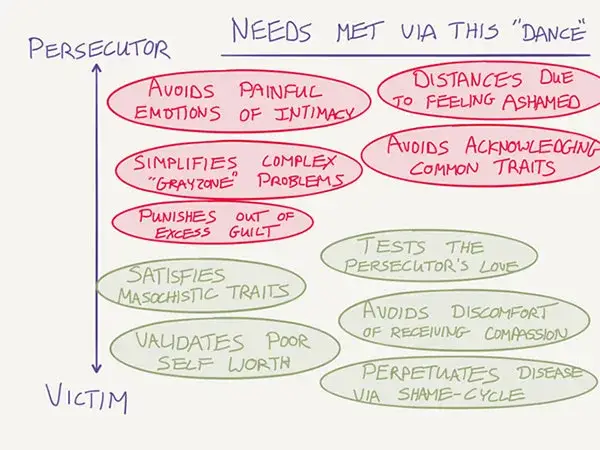FAMILY RECOVERY
Listen to the audio version of this article:
Drama Triangle: The Persecutor
The role of the persecutor in family recovery is one of the most fascinating in the drama triangle, as this person tends to defend highly against fear and sadness. The defense most commonly employed is one of anger, distance, and resentment. Through criticism and judgment of the addicted family member, the persecutor is able to cope with feelings of guilt and fear that would otherwise seem too overwhelming to that person. As we have reviewed with the other roles, the needs assessment of the persecutor is important to work through this role towards a healthy alternative.
Everything involved in the persecutor role leads to emotional distance. Through criticism of the addicted family member, the bonds between the people weaken and move further apart. This can become highly volatile in situations where the victim is continually working to re-engage with the persecutor, only to be repeatedly punished and shot down by that member. This pattern satisfies both sides of the dynamic as outlined above.
Does your loved one need rehab?
Tendencies for Punishment
We focus a lot on the concept of punishment in psychotherapy work. There are subsets of this behavior such as themes of dominance or submission, themes of guilt versus retribution, and goals of valuation versus devaluation. All of these tend to play out in the persecutor-victim dance of the drama triangle.
Have you have been in this position? It’s worthwhile searching for patterns of punishment and criticism in other relationships, besides with your victim family member. There may be unmet needs and psychological issues you should consider working through during independent therapy. If you only tend to be in this role via your specific addicted family member, it is more likely that you are reacting to their victim issues.
Communication Breakdown
The movement towards punishment often can signal frustration and difficulty in working through communication pathways. In this way, the persecutor in family recovery is demonstrating regressive behavior towards a position of acting-out the frustration. For family situations in which communication warrants improvement, we need to focus on that first before fully resolving the drama triangle. The healthy family path leans on good communication because this prevents drama and emphasizes talking over acting.
Statements such as “I feel frustrated” are very helpful for this. In some ways, if you fall into the rescuer or persecutor role and identify with the suggested needs outline in those dynamics, any communication that states the dynamic and brings it to the forefront is helpful. Examples of this could include the following additional statements:
“When you act this way, I feel very distant from you.”
“I feel scared for you and sometimes don’t like to acknowledge that fact.”
“Sometimes I feel confused about why you do the things you do. I know that you are doing your best and that you might feel confused as well.”
Each of these examples involves vulnerability from the persecutor. The persecutor may be intent on defending against any sort of emotional vulnerability and intimacy. We confront that head-on and emphasize the exact opposite. Vulnerability tends to break the punitive role.
Target Healing for the Persecutor
Just as with the other roles, the persecutor can morph into a healthy variant of the above. This would likely involve the family member becoming more of a ‘positive challenger’ around addiction. It may also be someone who would help with ‘holding the family member accountable.’
These roles emphasize honesty and authenticity in recovery while requiring the ownership to be on the addicted individual. This role transition also keeps the former persecutor engaged rather than distant. It acknowledges the dark side of the ‘addicted self’ which will try to manipulate the family system to continue the substance use. The new role of the persecutor is better able to confront that ‘addicted self’ in an effort to encourage the ‘healthy self’ to win.

